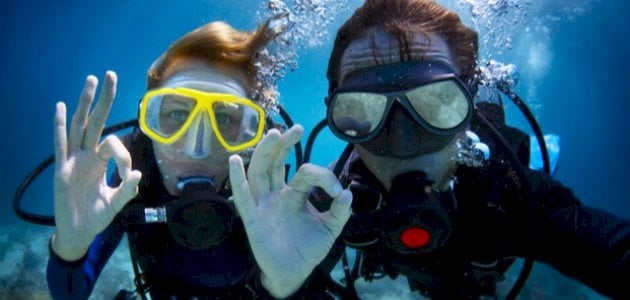Diving sport
Diving is considered one of the oldest sports known to man since ancient times, as in the past it was not a sport as much as it was one of the most important methods used by man. To collect pearls and search for food, as at that time there were no equipment and tools that we see in our current situation; They used primitive tools to help them stay in the water for a few minutes, after which diving became a means of entertainment and a recreational sport.
The physical dangers of diving
There are a number of diving risks that can be discussed, which include the following:
Increased gas pressure
Increasing the pressure of gases leads to poisoning, as the diver carries a cylinder containing both oxygen and nitrogen gas, and the partial pressure of both gases increases by (1 tomosphere) per (10) meters, which poses a danger to the diver and leads to poisoning.
Decompression sickness
Low pressure disease affects the patient if the pressure surrounding the body decreases quickly and suddenly, then bubbles begin to form. Due to nitrogen flowing into the bloodstream, these bubbles either grow in the blood tissue and cause pain, or enter the bloodstream through the lungs, in which case these bubbles can cause blockages in the arteries and blood tissues.
Read also:Benefits of playing tennis for children
Airway obstruction
The cause of bronchial artery obstruction is the pressure difference between the environment in which the diver is located and the lung. Which leads to the formation of bubbles in the arteries that prevent blood flow, and is prevented through good diving training and practice. When the pressure changes during the ascent, the lungs expand if the diver decides to stop breathing during the ascent, and the lungs may rupture or even explode completely.
Nitrogen anesthesia
This anesthesia occurs at a depth ranging between (24-30) meters, where this anesthesia is represented by the diver feeling as if he is drunk, and he becomes cheerful and unable to keep track of time and the amount of air he has remaining. To prevent it, more diving courses must be taken; When the depth exceeds (18) metres.
Increased lung expansion and increased pressure on the ear
When a diver rises to the surface and traps himself; This leads to air being trapped inside the lung, and this may cause it to expand and expand. To avoid this, you must ascend slowly and not hold your breath. The pressure on the ear also increases when diving or ascending, affecting the eardrum or the wound. Due to contact with sea sand or exposure to some animals that may sting.
drowning
It is one of the most common dangers of diving; It may occur due to panic that afflicts the diver, for several reasons: as a result of health reasons not related to swimming or diving, or fear of the ocean devoid of oxygen, as in this case trained people must be present, in addition to consulting a doctor before diving.
Read also:Benefits of taekwondo
Oxygen poisoning
Oxygen poisoning occurs if a concentration of more than (21%) of oxygen gas is used. This concentration is used at great depths, while at shallow depths its concentration is (21%), so there is no fear of it because poisoning does not occur there.
External diving hazards
Besides the physical risks to the diver, there are external risks in the underwater environment; The most important of these dangers is the risk of diving equipment malfunctioning, and the danger of the marine environment, so divers must take caution. To avoid these risks, learn how to treat them underwater and protect oneself from them; To avoid unwanted surprises.
Diving equipment breakdown
The diver must inspect and ensure the safety of the equipment before using it, and work to maintain it periodically and test it before each dive. When the diver is 30 meters underwater, the breathing apparatus or buoyancy control device may malfunction. This can lead to death and injury, and even a simple malfunction of the goggles can lead to the end of the dive.
Read also:How to defend yourself without a weapon
Marine life
As there are large numbers of poisonous and dangerous fish, which can cause damage and harm when they touch the diver, and the diver can also be injured by rocks and coral reefs. This leads to loss of enjoyment of diving due to pain and blood coming out from the wound, so the diver must wear full protective and protective equipment. He must avoid feeding marine creatures, as he will not be exposed to any danger or harm.









